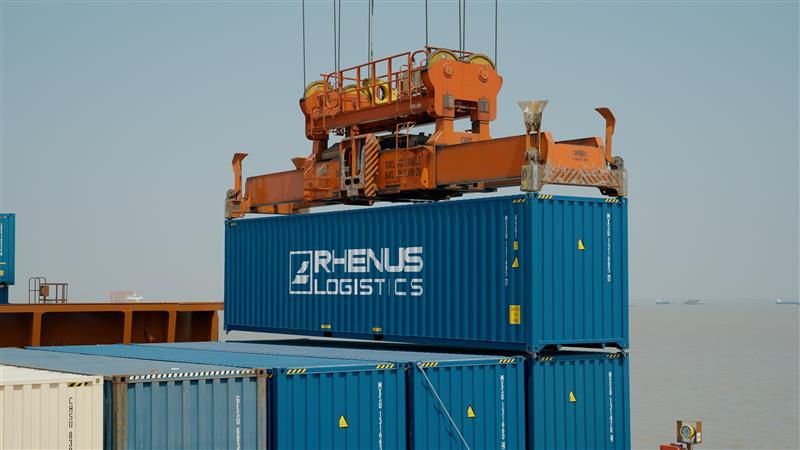BAKU, Azerbaijan, November 18. The international logistics group Rhenus Logistics, headquartered in Germany and specializing in multimodal transport and supply chain management, is gradually expanding its activities along the Middle Corridor as part of its long-term regional strategy covering Türkiye, the South Caucasus, and Central Asia, a source at the Germany-based international logistics group Rhenus Logistics told Trend in an exclusive interview.
Meanwhile, the company specializes in multimodal transport and supply chain management.
The company noted that Azerbaijan plays a central role in this corridor as a transit country and as a developing logistics hub connecting Asia and Europe. In particular, the Port of Baku and its infrastructure are a key element of the corridor, and Rhenus is closely monitoring these changes and assessing investment opportunities in the country.
Rhenus Logistics strengthens its logistics network along the Trans-Caspian corridor
After transforming its representative office in Baku into a legal entity in 2024, Rhenus began considering several new investment projects across the country, including a port logistics project that is currently under evaluation.
"Although specific details are not being disclosed at this stage, the initiative reflects the Rhenus Group's intention to strengthen multimodal and maritime connectivity in Azerbaijan. The project is currently under review, and further steps will be determined once the review is complete.
In addition to individual projects, Rhenus is focused on developing integrated multimodal solutions that efficiently and sustainably connect maritime, rail, and road transport. This includes the modernization of transshipment points, the creation of new depots, and the digital integration of customs, port, and rail processes," the source says.
Rhenus Logistics works closely with customers, partners, and authorities and invests where there is real demand, with the long-term goal of supporting Azerbaijan's economic development and creating a reliable and sustainable logistics infrastructure along the Trans-Caspian corridor.
Azerbaijan as a key bridge in the multimodal supply chain
"The Trans-Caspian corridor provides strategic diversification and resilience for global supply chains. It provides an alternative route connecting China, Central Asia, and Europe via the Caspian Sea, helping to reduce dependence on northern routes and ensuring more predictable transit times. For many shippers, this is an opportunity to remain independent of geopolitical risks and maintain continuity of transport in changing conditions.
Azerbaijan plays a central role as a bridge between Asia and Europe. The potential is significant: the country has already proven its ability to establish effective multimodal connections. For example, cargo arriving in Baku can be shipped by rail to Georgia and on to the Black Sea or Turkey in just a few hours, saving a significant amount of time compared to northern routes," emphasizes Rhenus Logistics.
This efficiency makes the corridor increasingly attractive for diversifying trade and strengthening the logistical resilience of Eurasia.
However, the route faces infrastructure and operational challenges, such as fragmented infrastructure and bottlenecks. In many places, there is a lack of modern terminals, intermodal hubs, and coordinated cross-border handling, which can lead to increased transit times.
Technical obstacles also remain: differences in rail gauge, limited rolling stock, and long distances between major cities complicate operations planning. In addition, differences in national regulations, tariff systems, and administrative procedures continue to slow progress, requiring closer regional coordination. Equally important are shippers' growing expectations for predictability and transparency throughout the route," the company noted.
Ultimately, the main advantages of the Trans-Caspian corridor are connectivity, predictability, and diversification. The main challenge is to turn these strengths into a fully compatible, reliable, and economically competitive logistics route — a goal that Rhenus is pursuing through long-term investment, local cooperation, and technical expertise.
Rhenus Logistics' forecast for freight volumes on the China–Azerbaijan–Europe route
"The company sees high and sustainable growth potential for freight volumes on the China–Azerbaijan–Europe route. As global supply chains diversify and companies seek more sustainable transport solutions, the Trans-Caspian corridor has evolved from a backup option to a major trade route.
Over the past two years, container traffic on the Trans-Caspian route has increased by approximately 35-40 percent per year, reaching about 3.2 million tons in 2024 compared to 1.5 million tons in 2022. With continued investment in key hubs such as Baku, Aktau, and Kuryk, as well as improved coordination of rail services between Kazakhstan, Azerbaijan, and Georgia, freight volumes are expected to double by 2030," notes Rhenus Logistics.
Further development of port and rail infrastructure, together with effective multimodal coordination, is likely to continue to stimulate growth in transport volumes in the coming years.
Rhenus' active presence in the region and at key terminals enables the company to support this growth and provide reliable, sustainable logistics solutions along the corridor.
Rhenus Logistics boosts digitalization of the Trans-Caspian corridor
"Digitalization is a key element of the Rhenus Group's logistics strategy, including its activities in Azerbaijan and throughout the Trans-Caspian Corridor. One of the promising areas is the introduction of digital corridor management systems that bring together customs, port, and railway structures on a single platform.
Such systems help to avoid bottlenecks, provide real-time visibility of processes, and use predictive analytics for more efficient capacity planning," the company notes.
Rhenus is also developing its own software for managing terminals and transshipment operations, drawing on its experience in designing and managing high-performance logistics hubs.
"The company intends to apply this experience in the region, reducing cargo handling times and costs, making the Trans-Caspian route more competitive compared to alternative routes. Reliable transit times and stable, predictable pricing are critical to the long-term success of the corridor.
Digitalization is closely linked to sustainability. Since Rhenus began operations in Azerbaijan in 2015, the company has expanded its range of services from road transport to multimodal services with a rail component, reducing emissions and increasing capacity utilization.
As part of COP29 in Baku, Rhenus supported local logistics operations with an environmentally friendly electric truck, demonstrating how practical innovations contribute to cleaner and more efficient logistics," Rhenus Logistics concludes.







